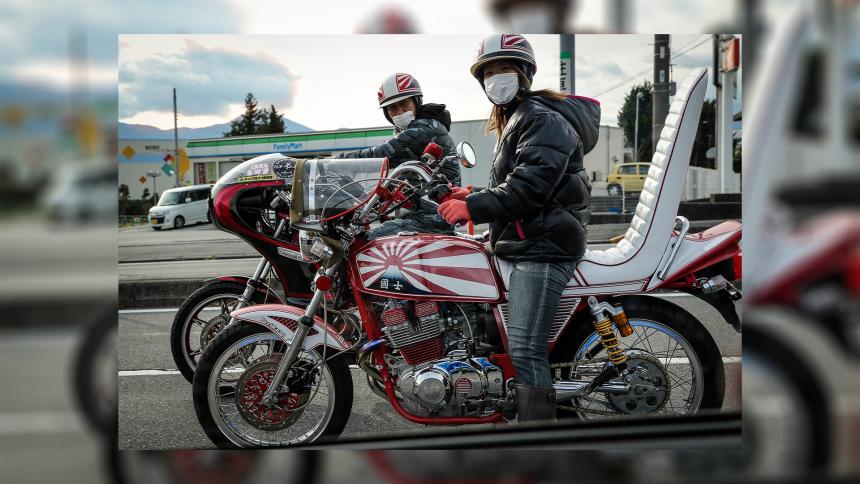
The world's weirdest gangs
Organised crime gangs. To some, the term brings to mind glamorous ideas of sharp-suited men in fedoras strolling down Sicilian stradas or half a dozen men bundling out of a van armed with sawn-off shotguns about to raid a jewellers. To those more interested in modern true crime, they might picture cannabis farms run by the Albanian mafia, Vietnamese people traffickers or Mexican drug cartels.
There are, however, some groups of organised criminals that no one will conjure up in their minds. We’re talking about the kinds of crooks that operate very much on the fringes of society. An underworld of unusual crooks with offbeat rackets and a unique style all of their own.
So, let’s forget - briefly - about the ganglands we know all about and take a little time out to explore some altogether more odd mobs…
These are the world’s most unusual gangs:
Japanese Bōsōzoku motorcycle gangs
After the end of World War Two, Japanese pilots who were trained as kamikazes but never deployed were left with a desire for thrills and danger that the mundanity of everyday life couldn’t provide. Many of them turned to an emerging subculture that became known as ‘Bōsōzoku’ (which roughly translates to ‘violent running tribe’).
Bōsōzoku is, in essence, a broad term for a certain type of biker gang, one which isn’t afraid to break the law. They came into their own in the late ‘60s and ‘70s and by the ‘80s and ‘90s were something of a scourge to Japanese society.
Known for their elaborately customised bikes, distinctive boiler suits and facemasks, Bōsōzoku gangs would get involved in anything from fighting to vandalism, theft to drug running. The gangs aren’t as popular as they once were, but in their heyday, they would prove a fertile breeding ground for the Yakuza, who would enthusiastically recruit from their ranks.
Ghanaian online fraudsters 'The Sakawa Boys'
Fraud is big business in Western Africa. While Nigeria is known for its myriad underworld of complex and lucrative criminal swindles, the most interesting gangs of internet fraudsters lie west, in Ghana.
Sakawa Boys dedicate their lives to scamming money out of foreigners. One preferred method is to pose as attractive western men or women and lure victims in via online chat room honeypots. Another comes from the kind of phishing scams your email provider should catch in your spam filter.
‘Sakawa’ comes from the Hausa for ‘putting inside’, a term for accumulating money. It’s not just a money-spinning scheme, either. Sakawa is a way of life. The Sakawa Boys are not subtle, they wear their jobs with pride, dressing ostentatiously and showing off their ill-gotten wealth.
It’s such big business that underground ‘school’s have cropped up in Accra, with classrooms of teenage Ghanaians crowded round computers, learning their future trade from experts. It’s big business and it’s going nowhere.
The delinquent 'Sukeban' girl gangs of Japan
They’re all but unheard of now, but in the 1970s, gangs of errant young women gathered on the street corners of Japanese cities and caused trouble. Drugs, shoplifting, violence, ‘Sukeban’ gangs - in their schoolgirl uniforms - may have looked like something straight from Manga, but they were very real and often quite dangerous.
After the end of the Second World War, Japan was licking its wounds and experiencing a financial and social depression. As is often the way in such times, crime rocketed. Disillusioned young men formed gangs. Gangs that didn’t accept female members. Soon, disillusioned young women formed their own gangs. These became the Sukeban gangs that would shock Japan.
The 'Notorious Nipple Gang'
Made up of cunning sex workers, this isn’t a gang as you might know it. But the ‘nipple gangs’ of Thailand are still well-drilled in robbing their victims and getting rich.
The grift is simple - pick up a customer, go back to their hotel rooms and go to bed. Here’s where the name comes in… With liquid Rohypnol rubbed into their breasts, when the punters’ mouth meets the powerful sedative, it doesn’t take long for the drug to take effect. Knocked out cold, they’re then robbed blind.
Of course, it’s not the most efficient way to drug a victim, nor is it the most common. It is, however, the most memorable. More often than not, the date rape drug is administered into a drink.
Romanian ‘chewing gum currency’ gangs
In 2012, areas of the UK with sizeable Romanian diasporas were experiencing crime waves. Very small, very minor and rather laughable crime sprees. Chewing gum was being stolen from shops and supermarkets. En masse.
Chewing and bubble gum were - and occasionally still is - taken for a very good reason. Money. It’s not so much that the gum has a resale value, more that it actually works as currency itself. In Romania, it’s not uncommon for gum to be handed to you in lieu of change, especially if you pay for a low-value item with a high-value note. If the place runs out of change, a piece, stick or packet of chewing gum is offered instead.
The 'Big Belly Gang'
A rapacious gang of pregnant shoplifters caused havoc in the Chinese city of Hangzhou for more than a decade. An ever-changing line-up of female thieves were thought to be responsible for more than 3,000 incidents of shoplifting in the coastal city over the ten years.
The successful police sting eventually led to 47 women being arrested back in 2011. When quizzed, the with-child gangsters confessed that they would often try to get pregnant specifically to remain in the gang. The theory behind it being that store security guards are less likely to suspect women with baby bumps.
The Dinner Set Gang
In the 1960s and 70s, Peter Salerno, Dominick Latella and Carmine Stanzione were a small gang of cat burglars that would target rich New Yorkers. They would do so while their marks were enjoying swanky dinners at home.
Also known as ‘The Fat Cat Burglars’, the gang hit upon the scheme when they realised that the city’s wealthiest residents often spent entire evenings in their dining rooms entertaining guests, leaving the rest of their homes unattended for more than enough time to break in and loot them. The victims’ servants would usually be preoccupied in the kitchen and it was generally considered bad manners to break away from the table throughout the evening. So, it was easy pickings and an extremely brazen crime indeed.
The hair-stealing 'Piranhas' gangs of Venezuela
The South American country of Venezuela, like many other countries around the world, is obsessed with beauty. It’s big business. So much so that high-quality hair extensions can sell for up to £700. You know what that means… Yep, that’s right. A black market.
Gangs of innocuous-looking men and women hang around shopping centres with concealed scissors and accost women, holding them down and cutting off their hair. It’s become such a big problem in Caracas that some women have taken to pre-empting such attacks, cutting their own hair off and donating it to children’s cancer charities.
Crime might not pay, but it can sometimes be out-and-out weird.




